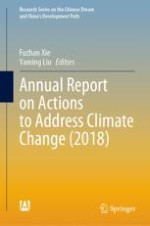2022 | OriginalPaper | Chapter
9. The Evolution of the Rule-Based System for Global Climate Governance Based on Science and Practices
Authors : Xiang Gao, Yun Gao
Published in: Annual Report on Actions to Address Climate Change (2018)
Publisher: Springer Nature Singapore
Activate our intelligent search to find suitable subject content or patents.
Select sections of text to find matching patents with Artificial Intelligence. powered by
Select sections of text to find additional relevant content using AI-assisted search. powered by
